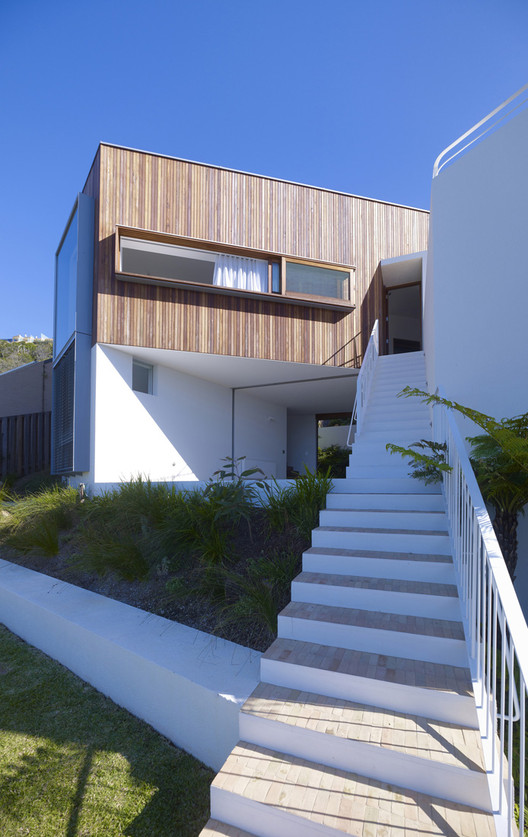
-
Architects: Neeson Murcutt Architects
- Year: 2008
Text description provided by the architects. Whale Beach House is located in the south-east fold of a steep, thickly vegetated hillside, below a towering escarpment, and looks out along the beach to Careel Head. The siting of the house is derived from a pragmatic mapping of adjacent building alignments, northpoint, neighbour's viewlines and required setbacks. These invisible lines establish the oblique geometries that characterise the plan, reminiscent of Coderch's Casa Ugalde in Spain. Challenged by overshadowing from the escarpment the mass of the building is located as close to the street as possible, also giving space to the large boulders, rare trees and rainforest preserved at the rear.
The house is a multi-generational family weekender organised over three levels that terrace with the slope - children and grandparents on the lower level, main living areas on the mid level and parents ‘secret' timber cabin on top. The plan is stratified, each level deliberately distinct from the other with internal stairs that are virtually hidden. Whilst the ceiling of each level is constant, the floors are stepped or ‘topographic'.

The project explores proximity and distance, invoking the special dualities of the site - the rock outcrops and native forest behind are given equal consideration to the front coastal panorama. Each room is considered almost autonomously, coordinated with the site and view. The experience of the house is cinematic as the view partitioned so that it becomes particular to each room - the horizon from the kitchen, the headland from the living room, the escarpment from the main entry, the rainforest at the back door. An array of opening types assists the orchestration - solid timber shutters that reveal the view when open, sashes that completely disappear, windows that capture the view within a sheet of fixed glass, strategic skylights for light without view. These strategies generate a spatial richness experienced as ‘surprise'.

Like its neighbours the house is elevated above the street, providing a degree of privacy. It is strongly articulated with upper levels clad in recycled timber that will darken in time to camouflage against the backdrop of the scarp. A void through the centre of the lower masonry level creates a view through to the garden. The native landscape is metaphorically drawn through this void connecting with neighbouring gardens across front. Careful collaboration between the landscape architect, hydraulic engineer, ecologist and builder allowed the waterway on the north-east side of the building to be restored, resisting to council's attempts to create a stormwater easement and instead enriching the landscape setting. The house and landscape are integral. Outdoor living spaces correspond with each level of the house and are equally varied.
The project demonstrates a holistic approach to sustainability - solar orientation, natural light, ventilation, efficient internal heating, materials choices, water collection, locally indigenous plantings and compact pool. The steeply sloping site was expensive to build on and the stormwater issues costly to resolve. The refined building detailing and landscaping were labour intensive, but felt by all parties to deliver enduring benefit.

























